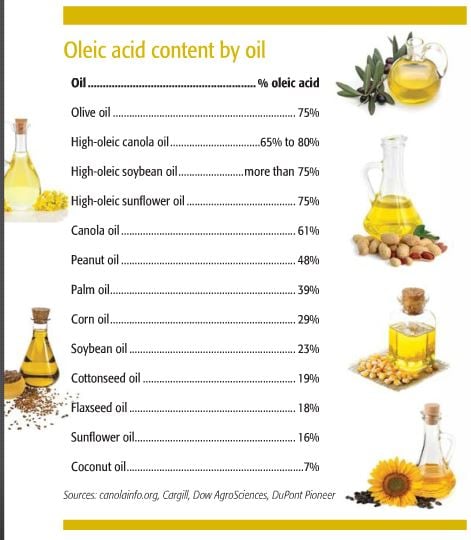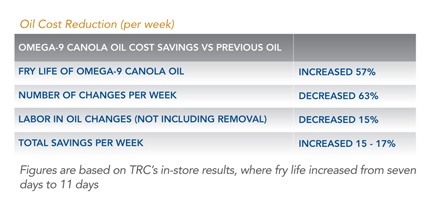Why would any food manufacturer choose to go with a high oleic oil over a traditional one?
This is a hot debate right now, especially for snack food manufacturers. There’s a number of reasons that a food manufacturer would opt to go with a high oleic oil over a traditional oil.
For simplicities sake, we’re going to discuss this in terms of High Oleic Non-GMO Canola Oil vs. regular Non-GMO Canola Oil so that the only variable is the oleic value. Of course, the same discussion applies to both non-GMO and GMO varieties of oil, as well as many different types of oils — sunflower oil, safflower oil, soybean oil, etc.
What Is High Oleic?
What does “high oleic” mean exactly? The descriptor refers to the level of oleic acid that is found in a particular type of oil, or more realistically, the original oilseed.
The oleic acid is also another term for monounsaturated fat — these are the healthy fats that are found in an oil. The higher the level of oleic acid, the higher the level of monounsaturated (or good-for-you) fat.
Each category of oil (sunflower, canola, etc) has a standard range for what are typical oleic acid values found in the oil. High oleic seeds are bred to contain more monounsaturated fat, and have higher average oleic values.
Higher Levels of Oleic Acid
The chart below shows an estimation of the oleic acid value found in each different oil. Note that this is an average — I’ve seen high oleic sunflower oil as high as 85%, for example.

The Benefits of High Oleic Non-GMO Oil
The use of high oleic oils is on the rise. At the same time, the non-GMO oils that support natural and clean food trends are also very popular. Put two trends together (high oleic and clean label) and what do you get? A super supply trend!
That super supply trend is in the name of high oleic non-GMO canola oil, high oleic sunflower oil and high oleic safflower oil.
These are ideal oils for natural snack food manufacturers, a category that is rapidly growing. FoodProcessing says, “the salty snack market should hit $27 billion by 2020… Potato chips are still the top revenue generator, despite challenges from ready-to-eat popcorn and caramel corn and alternative fruit and vegetable chips.” (Source)
So what benefits do these high oleic oils bring and why would a snack food manufacturer want to use them instead of regular non-GMO oils? Here’s why.
Extended Fry Life
High Oleic oils allow you to use them for longer before switching out your fryers. Therefore, if you are making chips, you can buy bulk oil often and use it for longer. Over time, this allows you to save money on your raw ingredients.
The same applies in the foodservice setting, allowing restaurants to save money — especially if they fry a lot of their foods.
“The Restaurant Company, franchisor of 19 Richmond, VA-area Arby’s, saw a 15% savings when they switched…
Restaurant leadership knew after just a 10-day test in two restaurants with High Oleic Canola Oil that they needed to make the change for their guests and for their business.”

Extended Shelf Life
High oleic oils are much more stable than their conventional counterparts. So in addition to having a longer fry life, they also have a longer shelf life and lend added shelf life to the products that they are used in.
Reduces Oil Usage & Waste
By switching to high oleic oils, a manufacturer can gain better operational efficiency. You will see a decreased number of oil changes, decreased product handling, and easier equipment cleaning.
If you are using smaller packaging sizes in a restaurant, you’ll support your sustainability efforts through a significant decrease in the plastic and cardboard used in oils packaging by making the switch to high oleic oils — simply because you’re using less oil (and packaging) over time!
More Healthy Fat
Remember that high oleic acid is another term for saying high in monounsaturated fats — the heart healthy fats that are better for your body than both polyunsaturated and saturated fats.
So not only do these oils help you save money and run more efficiently, but they are also better for your customers’ health.
Topics: Canola Oil, Sunflower/Safflower Oil












